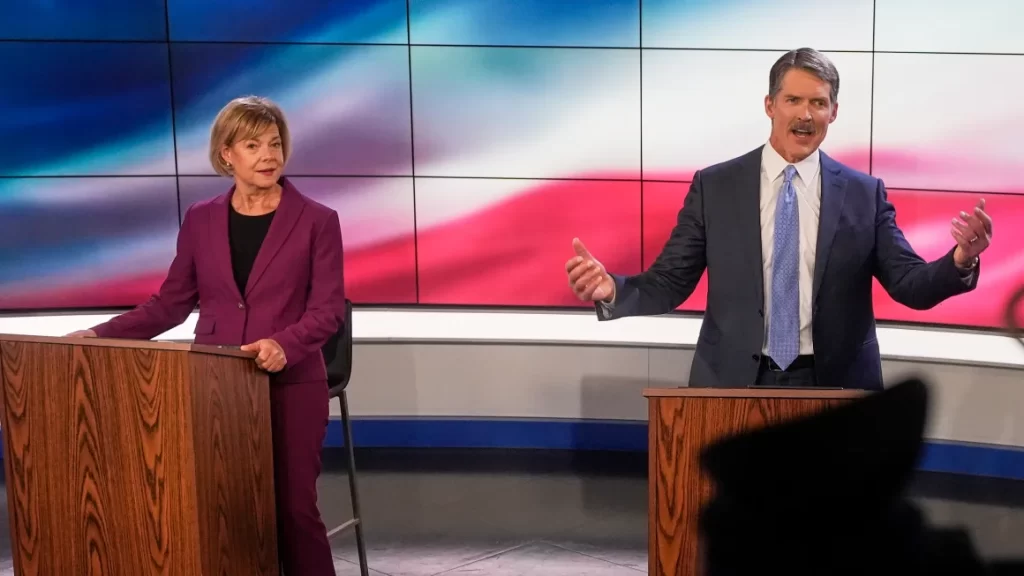As Wisconsin’s Senate race approaches its climax, tensions have escalated significantly, transforming a once-promising campaign for Democratic incumbent Tammy Baldwin into a deeply contentious battle. Baldwin, who made history as the first openly gay senator when she was elected in 2012, was leading comfortably in August. However, Republican challenger Eric Hovde, a wealthy banking CEO, has shifted the narrative to a personal attack focused on Baldwin’s same-sex relationship and her partner’s career.
Since the summer, Hovde and various GOP-affiliated super PACs have unleashed a series of ads alleging a conflict of interest due to Baldwin’s partner, Maria Brisbane, a financial adviser. These claims lack substantial evidence, but they have become central to Hovde’s campaign strategy. In response, Baldwin has been forced to defend herself against accusations that many view as a homophobic dog whistle.
When asked about Hovde’s tactics, Baldwin expressed her belief that the Republican candidate was trying to remind voters of her sexual orientation. “I think he is,” she told CNN. Hovde, however, dismissed the suggestion, stating, “I could care less whether she’s gay.”
This Senate race is now one of the most heated in the country, especially crucial as Democrats aim to maintain their foothold in the Senate amid a Republican push for control. Polls show the race is neck-and-neck, making Baldwin’s seat pivotal for Democratic hopes.
The campaign has covered a range of contentious topics, including abortion, immigration, and the economy. However, Hovde has leaned heavily into cultural issues, criticizing Baldwin’s stance on transgender policies and spotlighting her partner’s work to sway conservative voters and independents.
Baldwin, reflecting on the state of her campaign, stated, “This is the hardest race. It’s a very divisive time. I don’t see as many ticket-splitters as I’ve seen in the past.”
The GOP’s advertising strategy has emphasized Baldwin’s relationship by frequently referring to Brisbane as her “girlfriend” and questioning whether Baldwin should disclose her partner’s financial assets, a requirement that only applies to spouses under Senate rules. One Hovde ad features a woman in her kitchen saying, “Baldwin’s in bed with Wall Street.”
Baldwin has firmly rejected the notion that she should disclose her partner’s clients, comparing the request to asking a doctor to reveal patient information. “Stay out of my personal life,” she asserted. “I disclose everything I’m legally required to disclose.”
Hovde, who has personal wealth exceeding $195 million, has been criticized for his ties to California and his luxurious lifestyle, including a $7 million home in Laguna Beach. He has attempted to portray these attacks as unfounded, insisting, “I go to work every day with the people of Wisconsin.” However, Democrats argue his wealth could pose a conflict of interest if he were to serve in the Senate while maintaining ownership of his bank.
In addition to targeting Baldwin, Hovde’s previous comments have resurfaced, adding fuel to the fire. He once suggested that those who make poor lifestyle choices should face higher healthcare costs, a sentiment Baldwin has leveraged in her campaign ads questioning Hovde’s empathy and understanding of the average voter’s struggles.
Baldwin has countered the attacks, stating that she is fully transparent with her disclosures, while also pointing out that Hovde has not clarified whether he would sell his bank if elected. She accused him of trying to distract from his own questionable connections and judgment.
With the clock ticking down to Election Day, both campaigns are pouring resources into their messaging. Hovde’s campaign has aggressively targeted Baldwin, spending $51 million on ads since October, compared to the Democrats’ $39 million during the same period.
In a race that has turned personal, Baldwin has reiterated her commitment to issues over personal attacks. She stated, “I disclose everything I’m required to. He’s trying to distract from his own judgmental weaknesses.”
As voters prepare to head to the polls, the Wisconsin Senate race serves as a microcosm of the broader national political landscape, where personal attacks and cultural issues are taking center stage, raising questions about the future of both candidates in an increasingly polarized electorate.







